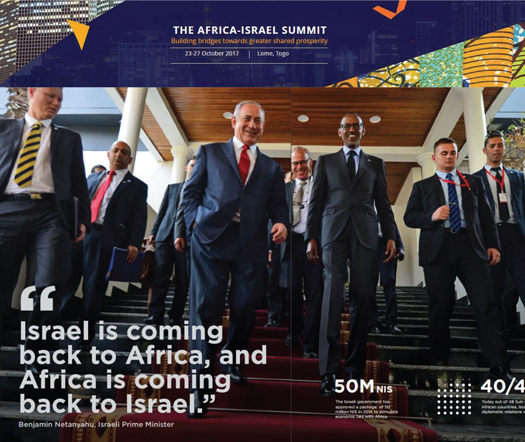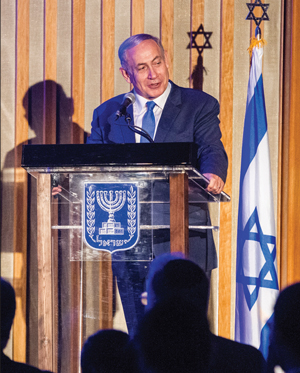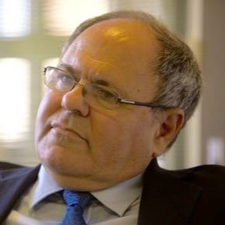Israel diplomatic payoff masquerading as aid to Africa?
By Jehron Muhammad -Contributing Writer- | Last updated: Aug 23, 2017 - 6:27:53 PMWhat's your opinion on this article?

Screenshot of pages 4-5 of the Africa-Israel Summit conference brochure.
|
Israel is on a mission to strengthen its ties with Africa. Not only has it made efforts to gain observer status with the Ethiopian headquartered African Union, in October it will co-sponsor the “Africa-Israel Summit” in Togo.

|
This newfound relationship with Africa, that includes the West African summit with at least 20 African heads of state attending, according to published reports, is all about influencing Africa’s 54-nation voting bloc in the 193-member United Nations.
A group of Palestinian activists, academics, and civil society organizations, reported Al Jazeera, have initiated a campaign to stop African nations from partaking. So far several African countries, including South Africa, Morocco, Algeria, Tunisia and Mauritania have openly proclaimed that they will boycott the summit, where Israeli Prime Minister Benjamin Netanyahu is scheduled to attend.
A recent letter to African governments and their respective embassies calls for a boycott of the summit, stating Africa’s involvement with an “apartheid state” is condoning Israel’s actions against the occupied Palestinian people and a violation of UN conventions.
The Popular Conference for Palestinians Abroad, which penned the letter, states, “African countries which fought colonialism for decades and became free after a long suffering should never associate themselves with the only, longest and most brutal colonial project in the world today.”
Popular Conference chair Salman Abu Sitta says the main consequence of this African-Israeli marriage is a loss of what is now a “solid majority” in the UN General Assembly in favor of ending the Israeli occupation of Palestine. In the recent past African nations, with their substantial voting bloc, have been supporters of ending illegal settlement expansion, dismantlement of the Separation Wall and have sided with the Palestinian cause when voting on a resolution concerning the right of return.
The summit, scheduled for October 23-27, goals include assisting Africa with enhancing cooperation with Israel in the fields of technology, development and security. But at what price?

Benjamin Netanyahu, Prime Minister of Israel, speaks at a special event, “Israeli Innovation and Technologies in Africa”, Sept. 2016 at the United Nations, New York. Photo: UN Photo/JC McIlwaine
|
Privately he made it clear that Israel wanted something in return.
“In meetings on the sidelines of the summit, (which Nigeria didn’t attend) he warned ECOWAS leaders that Israeli technology would solve their nations’ most urgent issues—as long as they opposed UN resolutions critical of Israel’s occupation of Palestine,” reported the African Independent.
So what could happen if African states, after benefiting from Israeli largess, fail to side with it at the UN? Senegal and Angola both experienced harsh and swift retribution for defaulting on their Israel provided so-called debt.
In December of last year, Senegal co-sponsored a UN Security Council resolution condemning Israel’s construction of settlements in the occupied West Bank and East Jerusalem. Angola endorsed the resolution.
Almost immediately Netanyahu cancelled Senegal’s Mashav drip-irrigation projects that were helping farmers increase yields in 12 rural areas in the West African country. Israel’s foreign ministry had promoted Mashav’s Tipa project as a major part of Israel’s contribution to the “fight against poverty in Africa.” Israel also recalled its ambassador from Dakar.
In Angola, aid from Israel came to a sudden stop. The Jewish state shut down an international aid agency that it operated within Angola that brought locals to Israel to gain exposure to advanced agricultural technology.
By cutting off crucial aid to Senegal and Angola, Israel was saying it would “battle poverty in Africa only if it suits Israel’s propaganda interests.”

Dani Dayan
|
Who is responsible for the summit? Published reports suggest Togo and Israel as co-sponsors. An interesting note was Togo’s president, Faure Gnassingbe, sending Netanyahu an official invitation letter to a summit Israel is a sponsor of.
But the behind the scene organizers of the summit is Africa-Israel Connect, founded by French national Bruno Finel and Edward Finkelstein. According to its website, the company, with “combine(d) 40 years of experience in Africa” is “dedicated to the rapprochement between Israel and Africa.”
What’s strange about its website is besides a few paragraphs and a beautiful color photo of a booming metropolitan unnamed city, and contact numbers and an email address, there is nothing else.
And if you go to the official summit website, africaisraelsummit.org, most of the sponsors are based in Israel, with the official international news network, the Tel Aviv-based i24News responsible for coverage. The summit will be broadcast in French, English and Arabic.
INSIDE STORIES AND REVIEWS
-
-
About Harriett ... and the Negro Hollywood Road Show
By Rabiah Muhammad, Guest Columnist » Full Story -
Skepticism greets Jay-Z, NFL talk of inspiring change
By Bryan 18X Crawford and Richard B. Muhammad The Final Call Newspaper @TheFinalCall » Full Story -
The painful problem of Black girls and suicide
By Charlene Muhammad -National Correspondent- » Full Story -
Exploitation of Innocence - Report: Perceptions, policies hurting Black girls
By Charlene Muhammad -National Correspondent- » Full Story -
Big Ballin: Big ideas fuel a father’s Big Baller Brand and brash business sense
By Bryan Crawford -Contributing Writer- » Full Story






 Click Here Stay Connected!
Click Here Stay Connected!








